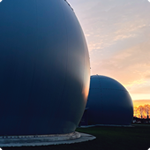Onondaga County's energy and sustainability goals are focused on reducing greenhouse gas (GHG) emissions, improving energy efficiency, and promoting the use of renewable energy sources. These objectives are aligned with the county's Climate Action Plan, which aims for a 25% reduction in GHG emissions over 25 years. The initiatives taken by the Department of Water Environment Protection (WEP) exemplify these goals through specific projects and upgrades.
|
|
Metropolitan Syracuse Wastewater Treatment Plant |
|
|
Digester Improvements
As part of the treatment process, Metro employs anaerobic digestion, where bacteria feed on organic matter in the wastewater. This process produces biogas, primarily composed of methane. Digesters, the equipment used for anaerobic digestion, are often recognizable by the torch on top, which indicates the burning off of excess biogas. The Digester Improvement Project aims to upgrade and rehabilitate all major digestion equipment, with a goal to increase biogas production by installing a new cover on one of the digesters. The addition of two new Duospheres to store biogas maximizes WEP's ability to reuse the biogas to heat and power parts of the Metro facility.
|
|
Baldwinsville-Seneca Knolls Wastewater Treatment Plant |
|
Autothermal Thermophilic Aerobic Digestion (ATAD) Upgrades
The Baldwinsville-Seneca Knolls Wastewater Treatment Plant (BSK) harnesses Autothermal Thermophilic Aerobic Digestion (ATAD) technology, for processing biosolids. ATAD uses the metabolic heat generated by the microbes digesting sludge to maintain high temperatures without needing an external heat source. ATAD also uses the nutrients present in the sludge to support microbial growth and activity, enhancing the breakdown of organic material. |
| |
|
Various WEP Locations |
|
|
Variable Frequency Drive (VFD) Upgrades
Variable frequency drives (VFDs) are pretty cool when it comes to saving energy. They control the speed and torque of electric motors by adjusting the motor's input frequency and voltage. What makes VFDs so efficient is their ability to tweak the motor's speed to match exactly what's needed for the job, instead of running at full blast all the time like traditional motor systems. This means they use way less energy, which is great for lowering your electricity bills.
But that's not all—VFDs also help keep motors in better shape for longer. By avoiding unnecessary high speeds, they reduce wear and tear, meaning less maintenance and fewer replacements. Plus, they make motor operations smoother, which cuts down on mechanical stress and the chance of breakdowns.
|
|
|
|
|





